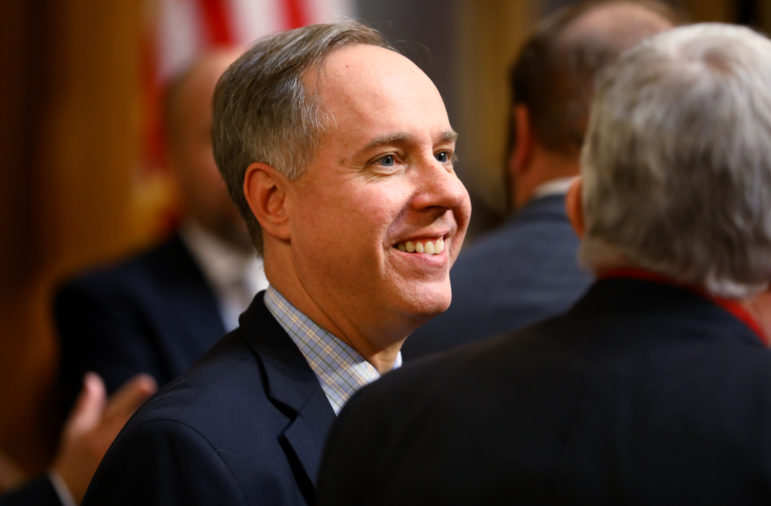Vos Doubles Down On Sales Tax Referendum
Milwaukee would get sales tax, but only if voters approve it in referendum.

Assembly Speaker Robin Vos. File photo by Coburn Dukehart/Wisconsin Center for Investigative Journalism.
Wisconsin Assembly Speaker Robin Vos is still pushing for Milwaukee to get approval from local voters before the city can adopt a 2 percent sales tax aimed at retiring pension debt, even after Gov. Tony Evers and the city’s mayor have voiced concerns on what would happen if such a referendum failed.
Speaking at a Milwaukee Press Club event Friday, Vos, R-Rochester, said he believes city leaders should have to convince voters why they want the tax.
“I still believe it should be a referendum,” Vos said. “I think that is the way that we do it all across Wisconsin if you want to raise taxes for your school district or fund police at a local level, at any other municipality, it’s done by referendum.”
The Milwaukee sales tax plan was included in legislation introduced this week to increase shared revenue, state funding for local governments across the Wisconsin. Milwaukee leaders have been pushing for the ability to impose a sales tax for years. The money would provide about $120 million each year to pay for the pension liability, which has been taking up an increasing share of the city’s budget and forcing cuts to services. A Wisconsin Policy Forum report found the city’s tax levy contribution to support its pension fund grew from $58 million in 2012 to nearly $130 million in 2022.
But the proposed legislation includes the stipulation that the tax be approved by local voters through a referendum. Local leaders, and some Republican legislators, worry that requirement would doom the plan.
Milwaukee Mayor Cavalier Johnson said city government should be able to make the decision on the tax. Following a public hearing on the proposal Thursday, Johnson said he believes hundreds of police officers and firefighters would have to be fired if the sales tax referendum fails, as the city faces an estimated budget gap of $156 million next year.
But Vos didn’t back down from his comments Friday.
“I think people want to have the easiest way to raise taxes possible. I don’t agree with that,” Vos said. “I think it should be a fairly cumbersome process. It should not be easy. You should go out and have to explain to people the reality of the situation.”
Sen. Mary Felzkowski, R-Irma, the lead author of the plan in the state Senate, said earlier this week that the referendum requirement is one of the remaining sticking points in negotiations. She said she’s concerned about the consequences for Milwaukee if the referendum were to fail.
In a statement released Thursday, Evers threatened to veto the Republican’s proposal if it wasn’t updated to include fewer restrictions for Milwaukee and more funding for local governments.
In response, Vos said he believed it was “bad form” for Evers to release that statement while lawmakers were still negotiating with the Governor. He had planned to meet with other lawmakers to discuss possible changes to the proposal.
“Before we even had the chance to do that, Gov. Evers issued a veto threat,” Vos said Friday.
A spokesperson for Evers did not respond to a request for comment Friday.
The shared revenue would mean some smaller Wisconsin communities would receive increases of several hundred percent, while the cash-strapped city of Milwaukee would see its state funding grow by 10 percent. But Milwaukee is the only community in the state where legislators are tying the cash to changes in policy, including requiring a two-thirds vote of the common council to approve spending for new programs.
Milwaukee’s Police and Fire Commission, the city’s civilian oversight commission of the departments, would also have less power under the proposed legislation. The changes also say the city can’t use the funds to expand Milwaukee’s streetcar and would require police officers to be posted in Milwaukee schools.
Vos said including school resource officers in the proposal to make sure that “everybody’s safe.”
“One of the easiest ways for us to have a safe community in the long run,” he said, “is to make sure that young people realize that they’re not allowed to create mayhem and all kinds of problems around the community.”
Listen to the WPR report here.
Assembly Speaker Robin Vos doubles down on requiring sales tax referendum for Milwaukee was originally published by Wisconsin Public Radio.




















There are many crazy and unacceptable parts in this Republican plan to harm Milwaukee. But having the voters approve any new tax increase is not one of them. That the Mayor does not want the public to weigh in is puzzling. He serves the public. We do no exist to serve him. He does not want our input?
The people’s trust level in city government is hovering around the approval level of the U.S. Supreme Court. The “we know what is best for you” message is one we can definitely respond to in the 2024 elections.
Issues as complex as shared revenue, budgets, pension funds, etc are complicated and confusing even for experts. Asking the general public to weigh in on this through a referendum and asking them to raise the own taxes is prone to oversimplification and distortion. (Remrmber Brexit?)
We elect public officials to make decisions just like we select trained pilots of fly planes and trained medical staff to run our health care.
If Mr. Voss thinks that referendums are so important for spending in a democracy, then we should have voter referendums on Foxconn and public financing of Fiserv Forum. Confiscating taxpayer money to make rich people richer is a Republican tradition.
Why must Milwaukee ask voters for approval of a new sales tax when many whiter communities can adopt sales taxes without any referendum? I refer, of course, to Wisconsin’s “Premier Resort Area” sales taxes (like the 1.25% local sales tax in Wisconsin Dells).
What’s interesting is that Voss and his Republican buddies have basically made state legislative elections in the state meaningless by gerrymandering 95+ percent of the districts.. The results are already determined before the votes are even counted. But now all of a sudden Voss is interested in giving the people a voice as to whether or not Milwaukee can raise its own sales tax. When did this epiphany for representative Voss occur now that he has decided that the people are so important, but apparently not important enough to have fair districts drawn for fair elections in the state. He can’t have it both ways.